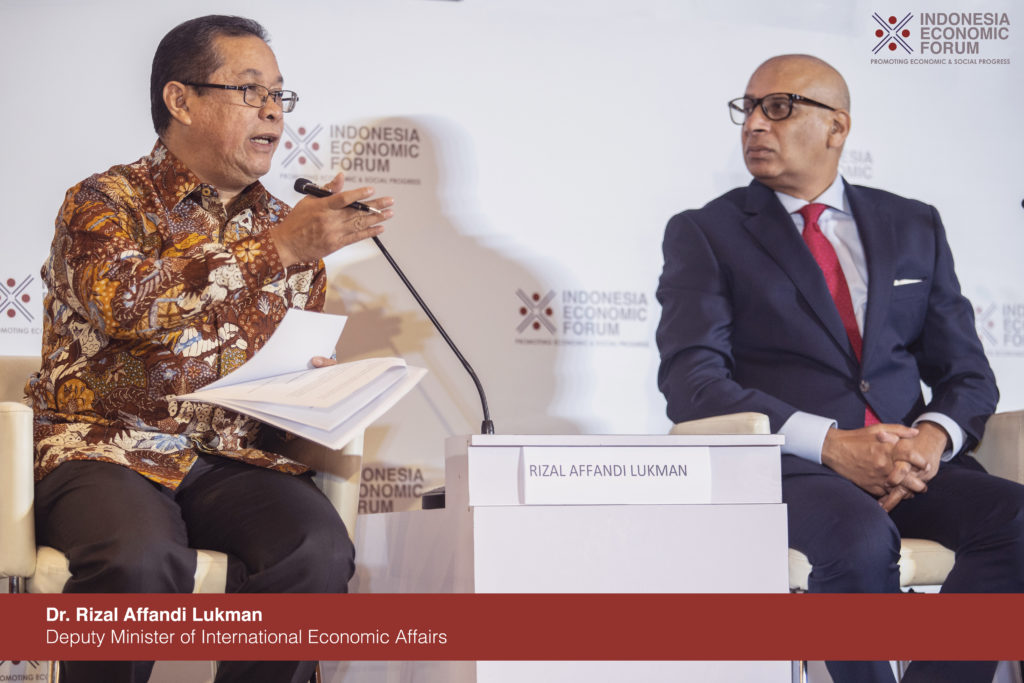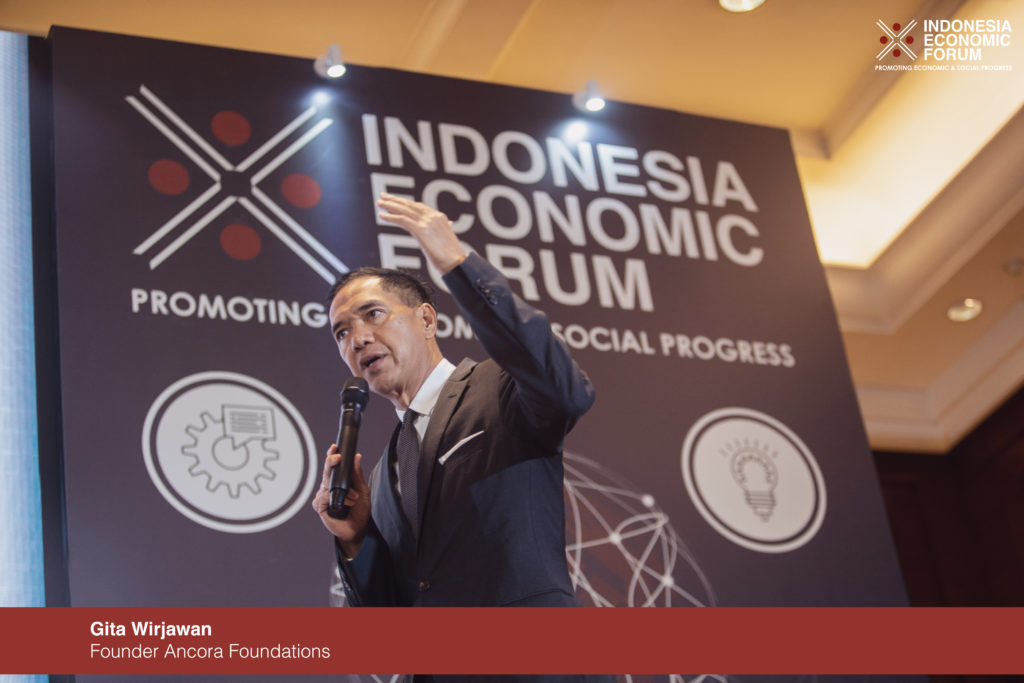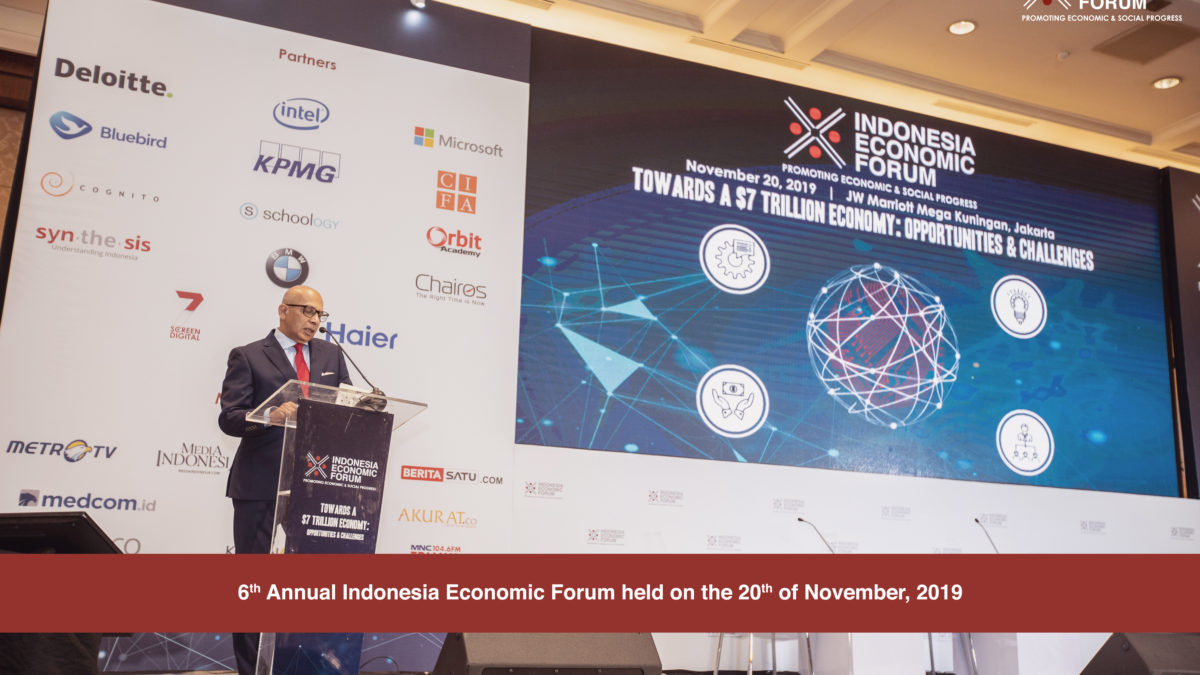6thAnnual Indonesia Economic Forum
Theme: Towards a $7 Trillion Economy: Opportunities and Challenges
Insights from global thought leaders at the 6thAnnual Indonesia Economic Forum 2019
Editor: Shoeb Z Kagda
The global economy is entering a period of great geo-political, technological and economic disruption; there is great churn in the world. The political discord in the US is reverberating around the world; Europe and the United Kingdom are locked in a long drawn out divorce; while China is undergoing a fundamental economic restructuring.
These global mega-trends will have a major and long-lasting impact on Indonesia as the nation of 260 million people also attempts to recalibrate its economic growth model and push towards becoming a top 5 global economy by 2045.
Reflecting on these challenges, the 6thAnnual Indonesia Economic Forum brought together global thought leaders, business owners, entrepreneurs, senior government officials, Chief executive officers of large corporations and civil society discuss, debate, provide fresh perspectives and strategize the way forward for Indonesia as an economy and as a nation.
Indonesia’s vision of a $7 Trillion Economy cannot be achieved through a business as usual approach, i.e being satisfied with a steady rate of annual GDP growth of 5%. As Shoeb Kagda, Founder of IEF, stated in his opening address, Indonesia must leverage on its competitive strengths.
One such key strength is Indonesia’s large young demographic, its millennial workforce. According to Mr. Kagda, Indonesia needs to focus on developing and integrating this workforce into the global knowledge grid, and not be restricted by national boundaries. By growing its own talent and by providing high calibre potential executives with opportunities to work for top international and global enterprises, it will ensure Indonesia’s citizens access to good paying jobs. Creation of such good paying jobs can only be achieved by focusing on human capital development and its integration into the digital economy. Industry 4.0, Digital Economy, Artificial Intelligence and Big Data Analytics will play a significant role in this age of the 4thIndustrial Revolution. Indonesia has to create an ecosystem that is well connected to the global knowledge grid and therefore, investments and partnerships with leading global institutions, high- tech firms and research centres will re-define this connectivity and help Indonesia adapt to a fast-changing environment by preparing its workforce for the future. Mr. Kagda also addressed the importance of service sector as a potential contributor to achieving a $7 Trillion Economy, by stating that the current flow of services in trade is 60% faster than the services in goods in Asia.

Mr. Rizal Affandi Lukman, the Deputy Minister of International Economic Affairs, also highlighted the many opportunities that the global economy offers to emerging markets such as Indonesia, and that an economic transformation is what Indonesia needs to achieve its goal of a $7 Trillion Economy. He mentioned one of the two main strategies implemented by the government to integrate Indonesia into the global economy through economic partnerships and multilateral trade agreements i.e RCEP. Increasing exports is one of the three strategies that has the potential to increase Indonesia dominance in the global economy. Indonesia, as stated by Dr. Affandi, is currently involved in ongoing trade negotiations with the European Union, ASEAN, Japan, China and six other countries, to expand the Indonesian’s export reach and attract investments. The key is to become a contributing country rather than just being a consumptive one. It is towards this end that the government is focusing on with its infrastructure development program and establishing free trade zones. He also emphasized the fact that the government has completed 62 national strategic projects by August 2019 and 19 more are lined up for the period of next five years as a part of the Infrastructure development program.

Mr. Gita Wirjawan, Founder of Ancora Foundation, along with shedding light on the economic realities from a global perspective such as the increasing inequity and inflation between financial assets and real assets, also touched on how tourism can impact GDP and play a positive role in boosting Indonesia’s economy significantly. He stated that the tourism to GDP ration in Indonesia currently stands at 1.4% but considering the government spending on infrastructure, he believed that there is no reason for Indonesia to be not getting 150 million tourists annually. Therefore, he believed that if rightly executed, the tourism sector could contribute up to 15% to 20 % of the total GDP and that in the context of a trillion dollar economy, that’s about $150 billion.
He also had a very optimistic and realistic outlook as to the role of the county’s young population contributing significantly to economy growth. As Indonesia’s population grows older, the number of people who have savings will rise as well resulting in the cost of money being reduced, which in turn might be beneficial for future entrepreneurs. He emphasized the fact that as the cost of capital comes down, anybody with a great idea can attach it to such capital, leading to technological disruption that is much needed in the Industry 4.0 Economy.
IEF 2019 focused on the sectors distinctive to Indonesia that could be capitalised to achieve its vision of a $7 Trillion economy. This also reflects the potential that Indonesia as an emerging market has and the long way that it still has to go to be one of the leading players on global stage.

